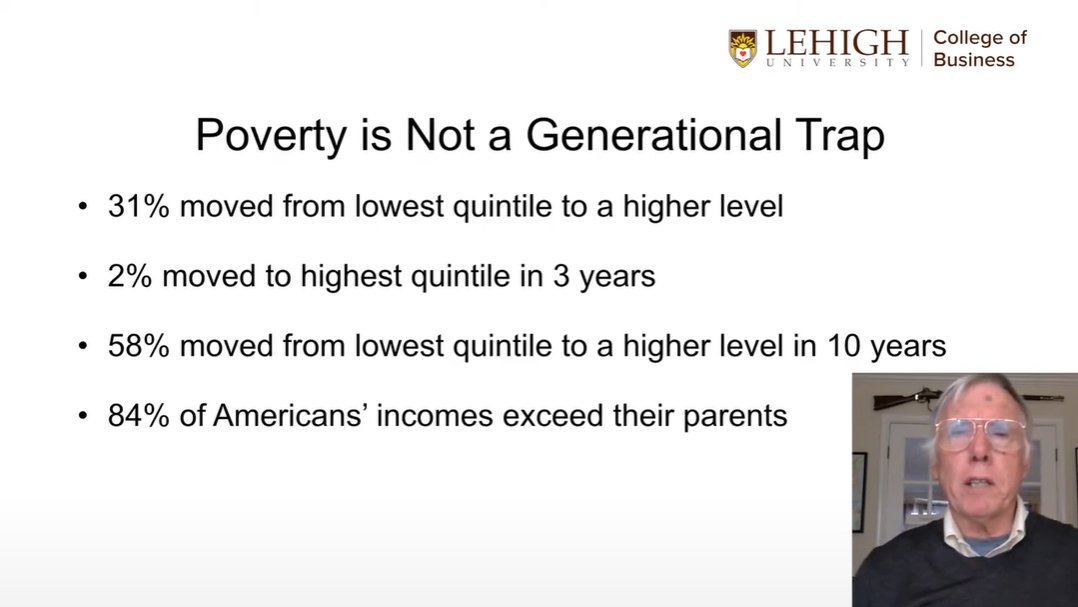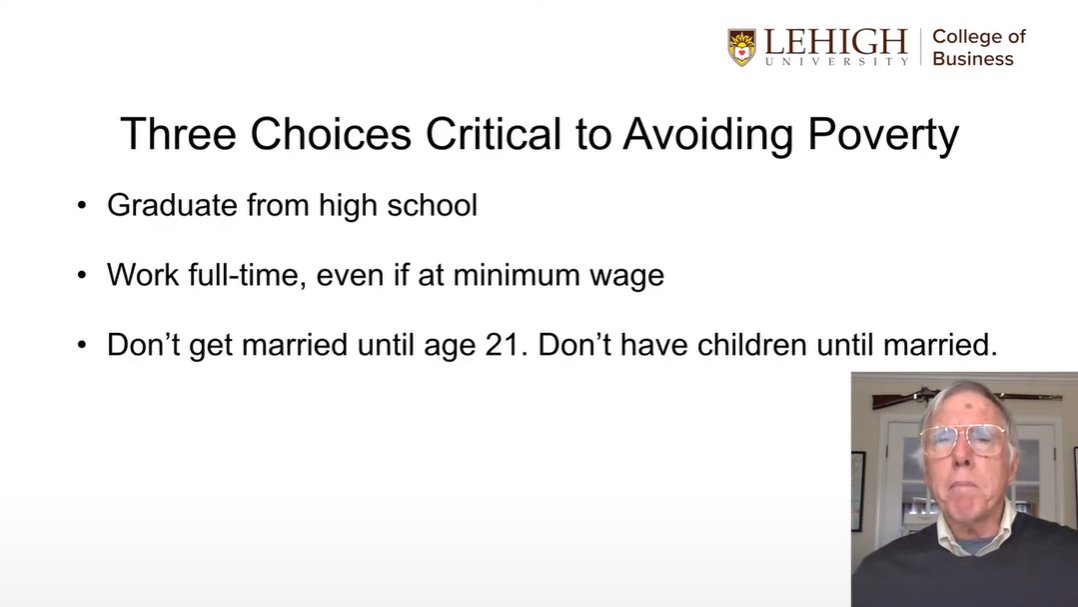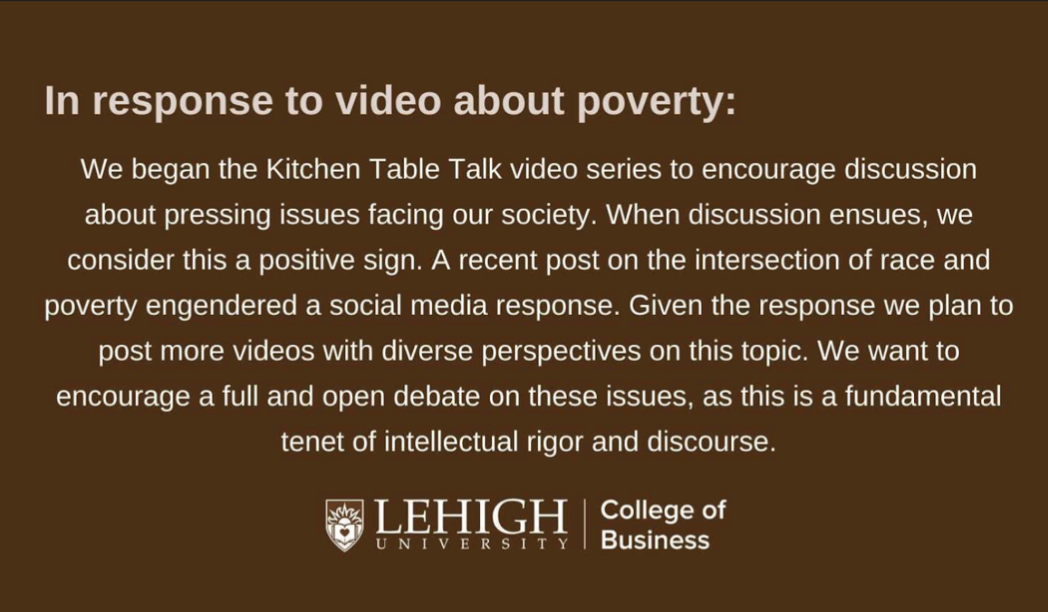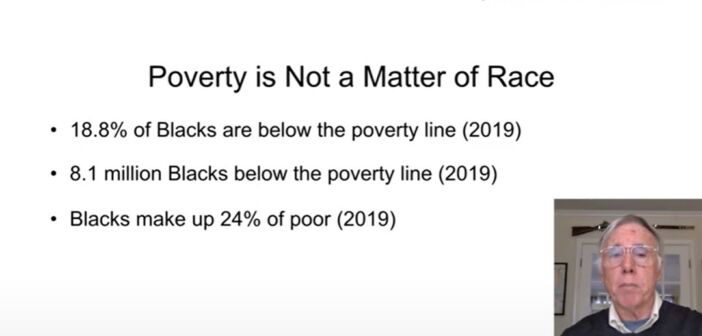“Attack my data, attack my analysis, but attack me? You don’t know me,” said Frank Gunter, professor of Economics, regarding responses to his video, titled Kitchen Table Talks 3.
Every quarter, Gunter writes a 700 to 900 word op-ed. Lehigh University’s College of Business asked him to turn his most recent op-ed,“Three Myths About Poverty,” into a short video, prompting the third “table talk” of Gunter’s video series.
The video, which was posted on YouTube by Lehigh University College of Business on Jan. 29, has since been taken down from the school’s channel due to significant backlash.
Lehigh’s media relations director Lori Friedman said the video was taken down to allow time for the concerns to be reviewed and to invite those in the Lehigh academic community to participate in the conversation.
“As an academic institution, we welcome public discourse and discussion. We affirm the right of the faculty, as well as other members of the community, to express their viewpoints and engage in a respectful and open exchange of ideas,” Friedman said.
Since the video was posted, both Gunter’s op-ed and his character have received hundreds of critical comments, most of which have been posted in comment sections on student-run Instagram accounts such as @dearpwi, @lehighstudentsforblm, and @dearlehigh.
In his op-ed and the video, Gunter attempted to debunk three myths concerning poverty—that poverty is mostly a matter of race, poverty is a generational curse, and the poor have no agency.
“The general belief is that if you’re born into a poor family, ‘God help you, there is nothing that can be done.’ But it turns out the reality is different,” Gunter said in an interview with The Brown and White. “What I was hoping the average reader would read and say is ‘that can’t be right,’ look into it, then discover that the facts are true and the analysis I provided is plausible. Maybe it would change their thinking about these important issues.”

Gunter’s first conclusion of the video was that poverty is not mostly a product of race.
“In 1940, it was estimated that 87 percent of black families lived in poverty. In 2019 most Blacks were not poor. Only 18.8 percent of Blacks were below the poverty line. In other words, four-fifths, over 80 percent of African Americans were not poor. Secondly, most poor were not Black in 2019, only 24 percent. The reality is most Blacks are not poor and most poor are not Black,” Gunter said in the video.
Sara Boyd, ‘22, took issue with his conclusion.
Boyd said the data Gutner provided said most poor people are not Black and most Black people are not poor, but that this does not imply that poverty and race are unrelated.
“It’s lazy economics. It’s incomplete research,” Boyd said.
Lehigh Students for BLM, @lehighstudentsforBLM on Instagram, posted an infographic to contextualize Gunter’s claims.
The post laid out a more in depth statistical analysis of the US population by race in attempts to better debunk Gunter’s claims.
In response, Gunter said he stands by his statement that poverty is not mostly a matter of race.
“Are (Black people) disproportionately represented? Absolutely, but what if we looked at the 2019 data and the numbers were reversed? What if we found that 80 percent of Blacks were below the poverty line and three-fourths of the poor in America were African American,” Gunter asked. “What would be the policy implication? If that was what the data found, I would say we have a severe racial problem in this country that is as bad as it was during Jim Crow in the 1930s and 1940s, but what conclusions can be made with the information we have, that 18.8 percent of Blacks are poor and 24 percent of the poor are Black? There is probably a racial element there, but race can’t be the whole answer because the majority of the poor are white.”
Gunter’s next conclusion of the video was that poverty is not a generational curse. To dispel this “myth”, Gunter explained a study that divided America into quintiles of income and explained trends in their quintile mobility.
“Even in a period of time as short as three years, 31 percent of the persons who were in the lowest quintile are in a higher quintile now. Escaped from poverty. Over 10 years…58 percent have escaped from poverty…,” Gunter said in the video. “84 percent of Americans have a higher income than their parents…the myth is not true. Poverty is not a generational trap.”
The @lehighstudentsforblm post said “The rate of absolute mobility for people born in 1940 was 90 percent. For people born in 1984, this figure has dropped to 50 percent,” indicating absolute mobility in America is not what it used to be.
In response, Gunter said he thinks that is true, however he believes the degree of remaining mobility is still substantial and has policy implications.
In the video, Gunter explained that even if someone is born impoverished, there are three steps one can take to nearly eliminate their chances of being impoverished as an adult: graduate from high school, work full time even if you are earning minimum wage, and do not get married until 21 while also not having children until you are married.

“If you follow these three rules, according to the Brookings institute, you only have a 2 percent chance of being poor as an adult,” Gunter said in the video.
Kate Luther, ‘22, is concerned with Gunter’s points about poverty being escapable and the “three choices” because she said it makes being poor sound like a simple choice.
Luther said Gunter’s points do not consider the obstacles one can face in life.
“You never know,” Luther said. “Sometimes kids have to drop out of high school because something happened to their family and then they have to work to take care of them.”
However, Gunter explained that he meant this to be motivational.
“I think a lot of kids growing up in poor families might say ‘Really, all I have to do is struggle through graduation, even though school stinks, and start working at a job, even though it starts out minimum wage and the boss hates me, and I love the girl, but won’t get married until 21 or have kids until we are married, then I will be able to avoid the poverty that I see around me?” Gunter said. “Some young people might find that an influential force.”
Boyd discovered this video shortly after it was posted and her initial reaction was that the overall data was “cherry picked.”
Boyd said she feels Gunter’s views were responsible for the type of data he used in the video.
“When you have a worldview and look for data that informs it, instead of looking for data to inform your worldview, you’re not actually doing research, you’re not doing critical thinking, you’re cherry picking data…even when it’s not in line with the facts,” Boyd said. “I could not get away with this in any of my classes.”
Luther and Boyd found Gunter’s language throughout the video particularly insensitive.
“His use of the word Blacks as a noun was pretty much in line with the datedness of the data he was citing,” Boyd said. “It was very clear both his views on poverty and race and how to engage in research are stuck in a previous century that have no place here now.”
Meanwhile, Garret Anderson,‘21, secretary of Lehigh College Republicans, said “Everyone was so concerned about his wording and not what he was trying to say, that’s problematic to me.”
Gunter said he has done his research on which terms to use.
“If you search to find out what is the preferred reference to African Americans, it’s almost a tie among the African American community, whether they prefer to be referred to as African Americans or as Blacks…one of the style references I use in my book writing treats the two as alternatives,” Gunter said. I think it is a matter of courtesy —you are to refer to someone in the way they wish to be referred.”
Gunter expected normal criticism to his op-ed, but not criticism of his character.
He said he was surprised that people who didn’t know him accused him of being racist.
“That is an insult now, you only call a person racist if you know 102 percent that they are. You don’t read one op-ed that they wrote and say this person says something I don’t agree with – I’m not going to argue with their data, I’m not going to argue with their analysis. I’m just going to call them a name. That’s surprising,” Gunter said.
@dearpwi on Instagram posted the slides from Gunter’s video with an attached slide at the end that read “While I don’t endorse slavery, economically, it is genius,” suggesting it was said by Gunter.
Gunter said the attached statement associated with him led to a lot of disturbed people, as it should if it were true, but that it was a “hoax.”
“Slavery along with genocide are probably some of the worst actions that can be committed – but it’s also bad economics —slavery has been a dead end in economic development. It has destroyed every society that adopted it,” Gunter said.
Friedman affirmed the inaccuracies of these claims.
Because of controversy, Lehigh College of Business issued a statement to explain the motive behind the video.
 Despite this statement, Boyd does not think Lehigh truly cares about an intellectual discourse.
Despite this statement, Boyd does not think Lehigh truly cares about an intellectual discourse.
Boyd was specifically bothered by the College of Business’ choice to delete comments that criticized Gunter and highlighted inaccuracies in his statements.
Marietta Sisca, ‘23, vice president of the Lehigh College Republicans, believes the anger toward Gunter in these comment sections is unnecessary and will do harm.
“The outrage and ad hominem attacks against Professor Gunter don’t address the body of his argument specifically talking about poverty,” Sisca said. “We can’t have a civil discussion about this important and interesting issue, including the aspect of race, by silencing an economics professor trying to bring more complex aspects of the topic to light.”
Gunter emphasized that there should be a meaningful dialogue.
“The purpose of a university is to have people look at old things in new ways or things that nobody has ever seen before. Are you going to upset people? Of course you are,” Gunter said. “The whole purpose of the university is to have some really great women and really great men looking at these things and saying the truth as they see it, even if the world is offended by the truth.”






Comment policy
Comments posted to The Brown and White website are reviewed by a moderator before being approved. Incendiary speech or harassing language, including comments targeted at individuals, may be deemed unacceptable and not published. Spam and other soliciting will also be declined.
The Brown and White also reserves the right to not publish entirely anonymous comments.
20 Comments
Looks like one partially sane professor is too much for the Snowflakes, very sad ?
This is kind of a frustrating article. It’s great you all interviewed Professor Gunter, and his thoughts should be presented. But, curious why you didn’t interview another professor who works in the sociology space who could present another academic POV? Or the students who actually run the Lehigh BLM Instagram account, instead of just grabbing quotes from their posts? It’s not really balanced to present quotes from Professor Gunter from your interview alongside quotes from an Instagram post that was published a week ago. This reads very much like a platform for Professor Gunter to defend himself (basically by saying he did research, so his claims can’t possibly be incorrect), and nothing else.
The coverage is more diverse than that for most articles promoting liberal causes.
It seems like you assume that the complaints concerning Professor Gunter are correct. I think the numbers quoted justify the conclusions made and his three suggestions are not only practical but are common knowledge. The criticisms are not looking as to why this information might be useful but are based on the fact that they are not full solutions to the problem of poverty. The three critical choices are effective but undoubtedly unacceptable to many, a restriction to personal freedom. Choices have consequences.
A full solution to poverty is an admirable but unattainable; progress is a necessary possibility.
Robert, congratulations on your continued racism and misogyny. A virtually unbroken streak, bathed in the light of the Lamb.
I suppose if you know you are right you don’t have to provide evidence for your position/statements and feel confident in name calling. especially if the names no longer reflect commonly agreed upon positions but rely on personal interpretation.
“A virtually unbroken streak”, at least you think that my words consistently prove your analysis and it’s not “guilty once guilty always”.
“bathed in the light of the Lamb” great thought but I feel more like “on the journey.” May the Covid be without you.
I would have defined “rate of absolute mobility” which could easily have been done along with the quote “84 percent of Americans have a higher income than their parents” (i. e. 84% rate of absolute mobility); but this is a good article. It certainly provoked comment and discussion.
Visiting the sites listed in the piece I would say Lehigh is a diverse place although I get the feeling that what is written there promotes a Lehigh that would be less diverse; who doesn’t want a group that looks and acts just like me.
I am pleased that Alyssa has tried and I think succeeded in fair reporting on the “incident”. It seems as though Professor Gunter was on some “naughty lists” before the video and what he said kept him there. To me his Affirmative argument was progress has been made and more can be done. The Negative argument was it’s not enough and we don’t like the way you stated it.
I’m a Lehigh Engineer, not an Economist or a Sociologist but it seems to me that this is an economic issue that is being discussed in sociological terms.
“…you only call a person racist if you know 102 percent that they are” is Professor Gunter’s viewpoint. I have a feeling that those unnamed who said he was or those who think he is feel 2% or less is adequate knowledge based on a reading of his words. What racism is defined as varies greatly from person to person; I have found asking for a definition can be taken as proof of it’s existence.
Gunter said. “The whole purpose of the university is to have some really great women and really great men looking at these things and saying the truth as they see it, even if the world is offended by the truth.” The world we live in is populated more and more with people who are not searching for the truth but who already are in possession of it. The truth is not always clear and when “truths” differ among people, a reasonable truth should be distilled by respectful collaboration; the task of a university not social media.
As usual Lehigh’s response was meant to be appropriate but probably pleases no one. It’s a tough job but somebody has to do it.
“As usual Lehigh’s response was meant to be appropriate but probably pleases no one. It’s a tough job but somebody has to do it.” This was written before the update and refers to: “The video, which was posted on YouTube by Lehigh University College of Business on Jan. 29, has since been taken down from the school’s channel due to significant backlash.”
Apparently my original response also applies to Lehigh’s second response, which has taken flak in comments. “Full and open debate” seems appropriate for a University when discussing something other than proven fact.
“If you search to find out what is the preferred reference to African Americans, it’s almost a tie among the African American community, whether they prefer to be referred to as African Americans or as Blacks…” -Gunter
There is a big difference between ‘Blacks’ and ‘Black people’. The issue being called out is using black as a noun, rather than an adjective, which Gunter’s response doesn’t acknowledge. A style guide from the National Association of Black Journalists says, “In news copy, aim to use black as an adjective, not a noun. Also, when describing a group, use black people instead of just blacks.”
Gunter is not a journalist, is he? Why should follow, or be familiar with, some “style guide from the National Association of Black Journalists”?
I was in Frank’s Money & Banking course when he first came to Lehigh from, I believe, First Boston, where he’d screwed up in risk management. Since then he’s been a Lehigh professor, and he wouldn’t know poverty if it bit him in the ass. He knows absolutely nothing about poverty.
Beyond the “hello I’m quietly 20th-c white-male-ignorantly-racist” language, I’m shocked by the op-ed level “facts” he’s peddling here, and wonder if he’s now reached the stage where old professors decide their deeply-held prejudices amount to scholarship, and go merrily expounding. Where to start? Oh, I don’t know, how about the -increase- in quintile stickiness? The fact that his “most” talk ignores proportionality? The horrific ignorance of his “three tips for avoiding poverty”? The whole thing actually sounds like a set of talking points from AEI or Cato. And what the hell, why is Frank’s rifle showcased in an econ squib?
I am a very strong proponent of learning through experience, and I propose that Frank take a field trip to poverty for the next 15 years and find out a whole lot more about it. Live on the social security, like a poor person does, and do it in a rental, without all the nice things he’s got from his three-percenter-or-so Lehigh salary. I’m sure all those lovely successful habits of mind he’s virtuously developed, without any aid from large impersonal forces, will sustain him just fine on approximately 200% FPL — I’m okay with giving him that, he’s got no practice with real poverty and you wouldn’t actually want him to lose years of his life. Other than that: all about the bootstraps, innit, Frank?
Also, that’s a positively cowardly response from Lehigh. Textbook bothsidesism. Who’s running this Kitchen Table thing? Please tell me it’s not Gilchrist. Matt, if it’s you, wrong way, turn around.
Many people are afraid to honestly discuss and debate economic and crime data – seems they prefer ad hominin attacks instead of working on issues.
I believe the data and openness to discussion is refreshing for the country and not surprising to me. Having grown up in a poor enlisted military family I saw a wide diversity of people pull themselves up and and bring their children like me to an even higher level of economic prosperity. At least 20 years ago being born into a poor family was not being born into a caste – many moved up and down. Minimum wage hikes, enhanced automation, increased regulation on start-ups and all businesses, and cheap immigrant labor could cause most 20 yos to earn less than their parents – this is what we should focus on – how to grow the economic pie for all.
Unfortunately hope and inspiration is not popular now? Do you think we have fewer endangered animals and cleaner air and clearer skies compared to 50, 60 , 70 years ago? The answer is “yes” the environment is much cleaner and safer. You won’t hear that because the scare lobby of endless non-profits (including unis), media, and politicians are locked in a cabal that wants to beat down everyday people with fear and regulations into serfdom. In almost every way measurable life is better for all people on the planet and esp in America regardless of race, sex, or age.
“In almost every way measurable life is better for all people on the planet and esp in America regardless of race, sex, or age.” I’ll offer exceptions for the proliferation of “attitudes” and the tendency to not respect others. These possible exceptions make it difficult to make progress or even to determine what progress is.
Listen, there are multiple schools of economic theory and policy and a university is absolutely the forum to discuss and debate them. But what I find laughable in all of this are the undergraduates who see one infographic on Instagram presented in a way that squares with their worldview and are convinced they are economic, sociology, and/or public policy experts who have all the facts and all the answers. What does Frank Gunter, a PhD economist with 44 years of scholarship and 37 years of teaching experience, really know about economics anyway? Professor Gunter is not immune to professional and academic criticism—and he welcomes it, as he should. Students should not take what Professor Gunter says as gospel and should challenge his propositions, as well their own, not fully-informed understanding of economics and their intersection with societal issues and overall worldview. But it takes a certain level of self-aggrandizement and ignorance for a double major in Political Science and English (who has yet to earn their Bachelor’s degree) to dismiss an economist with 40+ years of experience as allegedly trafficking in “lazy economics” and “incomplete research” simply because what he says does not align with the echo chamber in which they live.
That’s exactly the problem, and you haven’t done your homework, either. Frank’s argument is not only garbage, it’s talking-point garbage. It’s not serious economics. You find more serious economics in The Atlantic. NYRB. Foreign Affairs. Even in the Economist, as startling an idea as that may be. He’s dredged up conservative think-tank talking points from the early 2010s (at best) and ignored all criticism of them, of which there was plenty at the time. You could even look it up! Plenty of it’s still there online. You don’t need someone else to donate hours of their time patiently explaining to you why Frank’s table talk was garbage.
Sparknotes: There’s no reason to respond to anything so lazy with serious argumentation. Frank showed up with propaganda and he got better than he deserved right back.
Homework, what a shocking idea. It’s wonderfully consistent how you guys assume you shouldn’t have to do any. And then you show up moaning insincerely about no one’s presented you with a careful argument you aren’t interested in reading anyway. That went on in the early 2010s, too. Guys showing up just asking questions as a stupid rhetorical dodge, uninterested in either listening or earnest good-faith conversation. JAQing off was what it was called. Now you don’t even bother with the questions. At least you’ve become that much more honest.
I was with you until: “Frank showed up with propaganda”. Anonymous ’92 hints that the three items may be useful; those who disagree seem to argue they won’t totally solve the problem, which they won’t. Thus shouting commences with recriminations for supposed evil intent. Once again we need to listen to to the great common-man philosopher Rodney King.
Those three suggestions seem to upset some people as much as the wearing of masks, in our current pandemic. does to others. Speak to us Rodney.
Do you have any actual evidence for this post? It sounds like a lot of bloviating to me.
Anyone familiar with the research of Dr. Thomas Sowell knows exactly where Prof. Gunter came up with all three of his arguments. If you are blinded by the color of Prof. Gunter’s skin, then try reading the same arguments from the pen of a black man who grew up poor in the segregated south of the 1930’s and 40’s.
1. That ain’t the problem, sis. Being Black doesn’t make Sowell less wrong, and, again, there’s plenty of critique of Sowell’s work out there.
However, if you graduated in ’92, you shouldn’t have to be told how racist your own approach here is. Being Black doesn’t mean you can’t advance racist arguments. Women can be misogynists. Jews can be anti-semites. You’re doing the thing that men accused of sexual harassment do when they haul a woman in to say that they’re dandy human beings who couldn’t possibly have: you’re attempting to use someone from a disadvantaged group as a figleaf for your own bigoted views.
2. I propose Lehigh change its motto to YONDER HILL OF SELFISH BROS. It’d look awesome on a sweatshirt.
I have no connection to Lehigh, and I don’t know any of the people involved or writing on this page. I’m reading snippets of comments from Gunter who, at this point, would be better served be closing his mouth and listening to the students.
As I understand it the people who surfaced this issue with this professor are undergrads, possibly new to post secondary education and are at university to learn and participate. What did Gunter think was going to happen? How long has he been teaching at this level? Is this the first time he has broached this subject matter? I’m confused, because the comments attributed to him and comments he admitted to saying in this article are… really dumb. The section on “Three Choices Critical to Avoiding Poverty” reads like it was targeted for minority students. Minority undergrads have heard this directly or the inference their entire life… there is no mistake who the target of these ‘choices’ are.
And then the Republican party which has become a cliché for ‘anti-anything minority’ weighs in defending Gunter.
Meanwhile, Garret Anderson, secretary of Lehigh College Republicans, said “Everyone was so concerned about his wording and not what he was trying to say, that’s problematic to me.”
What is problematic is that Anderson just stereotyped what Republicans have been accused of for some time; total insensitivity and defense of Gunter rather than questioning why he made such comments. Why would Anderson or anyone expect students or anyone reading this article to even try and understand what Gunter was “trying to say.” He is a college professor! There is no trying to say. There is only saying. What he thinks is not the responsibility of a student to figure out or even possible.
Then there is Marietta Sisca, vice president of the Lehigh College Republicans, who is worried about not being able to have civil discourse if Gunter is silenced? At this point Gunter should silence himself and the Republicans who are defending him. Republicans are only adding fuel to the proverbial fire defending Gunter’s comments, especially in light of the Republicans going all out to rewrite the rules of elections in ways that are designed to marginalize and in some cases even prevent minorities from voting. Sisca’s and Anderson’s concern for civil discourse has a hollow sound in view of recent events. Making voting more difficult is a transparent throwback to a time in American history not to long ago that some of these students parents may well remember; a time when they were denied the vote.
And one further observation; Gunter references his search to “… find out what is the preferred reference to African-Americans or as Blacks …”, shows Gunter’s continued lack of sensitivity. To some White trained ears the paragraph sounds innocuous; its not. To speak of people who have been classified their entire history in the third person, often pejoratively, to want to “find out” speaks to an ignorance and insensitivity. BTW… this is coming from a white academic that is in Gunter’s age range that has seen the neoliberal attempts to indoctrinate rather than facilitate learning. Students are not going to accept what a professor says ‘just because.’ They want answers, not transparent inanities and how-to instructions that are insulting. This is not the Marine Corp colonel.
I don’t know Professor Gunter, I don’t know the efficacy of his scholarship or teaching. I’m not judging him for that. But if he does not realize that every word he says is listened to and taken literally as it should be (sorry, but no hermeneutic analysis of conversation), every action he makes is measured, and the certainty that he will be judged by the students, then he should prepare for more of the same he is getting now. Perhaps taking a class in Critical Race Theory might provide some insights to Professor Gunter.
And Professor Gunter… you should dump your Republican defenders. They just add insult to injury.